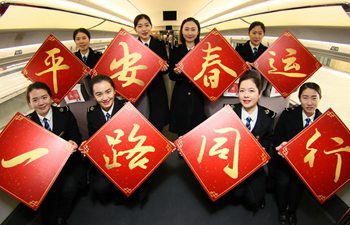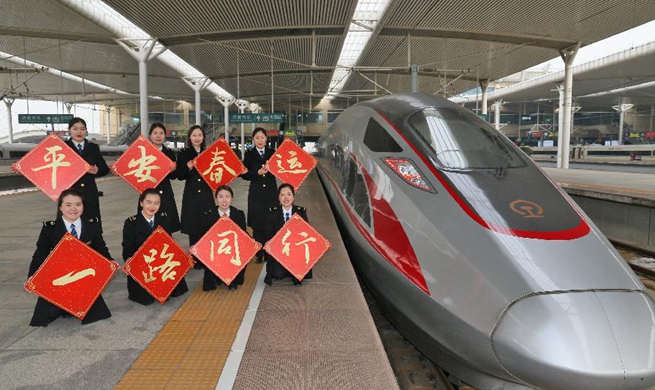by Liu Jie
BEIJING, Jan. 31 (Xinhua) -- When U.S. President Donald Trump named China as a rival to challenge the United States, in his first State of the Union address Tuesday, he ought to have been aware of how the growing reciprocity between the two economies could help illuminate his "new American moment."
In one of the longest State of the Union addresses in recent memory, Trump touted a strong U.S. economy with rising wages, falling unemployment and returning manufacturers. "There has never been a better time to start living the American dream," he said.
He singled out China and Russia as rivals of the United States that challenged U.S. interests, economy and values. He indicated that "fair and reciprocal" trade was necessary.
The words hardly come as a surprise from a man who promised in his inaugural address a year ago to protect America from other countries making products, stealing their companies and jobs.
It is important not to forget the different economic development stages and growing complementarity in economic structures between China and the United States. This lays a solid foundation for cooperation, from which both can gain.
It is better for the United States to see China as a partner, rather than a rival, with a joint future rather than a divided one. China contributed to the American dream, rather than destabilized it.
In the eyes of Ha Jiming, a senior researcher with the think tank China Finance 40 Forum, the complementarity still outweighs the competition between the two economies.
The classic case of complementarity between the two comes from the fact that China is abundant in low-cost labor, while the United States is rich in capital. Now China is getting richer in capital, but its labor cost and productivity, though rising in recent years, are still far lower than in the United States. The basis for complementarity remains intact.
Room for cooperation looms larger in industry, infrastructures and online payment. President Trump called for massive funding to build the gleaming new roads, bridges, highways, railways and waterways that the country desperately needs. China has about 22,000 kilometers of high-speed railways. Some 13 percent of its domestic retail sales are made from online vendors, compared with 8 percent in the United States. China has a readiness to share its resources and experiences with the United States.
It is important to remember bilateral trade relation is two-way street. The United States has overtaken the European Union to reclaim its position as the largest trading partner with China. China holds a surplus in goods trade, while the United States has a surplus in service trade, and the latter is growing faster than the former.
It is also important to know that structural issues contribute to the trade imbalances between the two countries.
"Tracking a trade deficit is misleading. All that [trade deficit] means that we in the United States consume more," said Tori K. Whiting, a research associate at Washington-based think tank the Heritage Foundation.
While China and job losses are discussed as one and the same by certain parties on Capitol Hill, the reality could not be more different. Chinese companies are opening new plants and hiring people in America -- a scenario largely absent from the rhetoric of some U.S. politicians.
According to a report by the National Committee on U.S.-China Relations and Rhodium Group, employment by Chinese-owned firms across America jumped nine-fold between 2009 and 2016, to 140,000.
Longer-term and broader views, rather than protectionism, are needed to address the imbalances and diminishing manufacturing jobs in the United States. Protectionism will reduce economic efficiency and consumer welfare.
China is on the way toward rebalancing its domestic economy and pushing toward market-oriented reform. As Ha Jiming has noted, these changes will eventually help reduce U.S.-China trade gaps and alleviate U.S. concerns over unfair trade practices.
The world is experiencing synchronous global growth, but its basis is not solid enough. The risk of policy mistakes between China and the United States could be high, and would deal a heavy blow to the world economy.
Given the high stakes, the world is better off when China and the United States behave like partners rather than rivals.
















